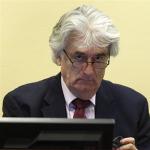23 November 2009

Photo: AFP
Wartime Bosnian Serb leader Radovan Karadzic appears at the International Criminal Tribunal in the Hague to face war crimes charges, 03 Nov 2009
Former Bosnian Serb leader Radovan Karadzic is being tried before the U.N. war crimes tribunal in The Hague. Many analysts believe the court's credibility is at stake in this high profile trial.
Karadzic faces 11 counts of genocide, crimes against humanity and war crimes stemming from the 1992-95 Bosnia civil war. He and Bosnian Serb military leader General Ratko Mladic, who is still at large, are accused of ordering what is considered to be the worst atrocity in Europe since the Second World War: the massacre of an estimated 8,000 Muslim men and boys in the U.N.-protected Srebrenica enclave in July 1995.
Karadzic was arrested in Belgrade in July 2008 and extradited to The Hague. His trial began last month. Karadzic wanted to defend himself, but the court provided him with a lawyer. His trial will resume in early March to give more time for the defense to prepare its case.
A Bosnia expert at London's Kingston University, Marko Hoare, says the international tribunal wants to avoid what happened during the trial of former Yugoslav President Slobodan Milosevic.
"Milosevic deliberately sought to undermine the tribunal through his courtroom antics, refusing to recognize the tribunal and using it essentially as a platform from which to pontificate politically to his domestic audience. So he was proven to be disruptive and as it turned out, he succeeded in delaying the trial so far that he died before the case was complete," Hoare said.
A former legal adviser to the Bosnian government, Paul Williams, and other experts say there is a lot at stake for the court in the Karadzic trial.
"The Karadzic trial is hugely important for the credibility of the court because they have yet to effectively prosecute one of the three masterminds: Milosevic died in custody, they now have Karadzic and Ratko Mladic, the general for Republika Srpska is still at large, presumably in the Republic of Serbia. So of these three masterminds, Karadzic is the only one that they have an opportunity to establish the guilt and to tell the whole picture, to establish the full, accurate historical record for the Yugoslav conflict," Williams said.
He says Karadzic will undoubtedly try to tell his side of the story.
"I expect Radovan Karadzic to try to shed light on the engagement of key members and key states of the international community in accommodating what was happening in Yugoslavia. I do not think there's a question of complicity in these crimes, but he will make the argument that how can I, Radovan Karadzic, be charged with genocide and crimes against humanity when all of the envoys were negotiating with me on a regular basis, when they were reaching out the hand of peace across the table, when President Jimmy Carter came to Sarajevo and negotiated the ceasefire [in December 1994] - how can you accuse me of being responsible for genocide?" said Williams.
As the experts pointed out, one key former Bosnian-Serb official remains at large: General Ratko Mladic.
A former prosecutor at the international court, Alex Whiting, believes Mladic is in Serbia.
"Ratko Mladic remains enormously popular in Serbia. And in my view, the Serbian government has calculated that it is more in their interest to allow him to remain a fugitive than to capture him. They are weighing his popularity in Serbia against the pressures that are felt from the international community. The only way that he will be captured and surrendered is if the international community remains absolutely firm in demanding his surrender and if it conditions further cooperation and assistance to Serbia on his surrender. If that does not happen, I do not think he will ever appear before the court," Whiting said.
Other analysts say the Karadzic trial sends a powerful message to leaders indicted for war crimes that it may take time, but ultimately they will be arrested and face justice for their crimes.